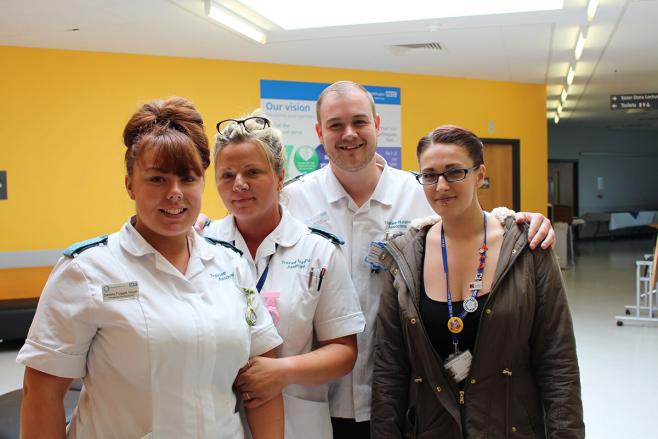You are here
Trainee Nursing Associate numbers continue to grow as thousands more train to become Nursing Associates
6 February 2019

Over 5,000 people were recruited as trainee nursing associates in 2018, building on the 2,000 recruited in 2017 Health Education England (HEE) has announced today.
The news means that HEE has met it target for recruitment to the new role that sits between nursing care support workers and fully qualified registered nurses to deliver hands on care for patients.
Trainee Nursing Associates work in range of settings up and down the country from acute hospital settings to care homes.
Announcing the news Stephen Hammond, Minister of State for Health said:
HEE have been leading a national Nursing Associate expansion programme in 2018 to train up to 5,000 through the apprentice route. I am delighted to announce today that HEE have confirmed they achieved the target of 5,000 Nursing Associate apprentices in 2018.
This is a fantastic achievement which is down to the hard work of HEE with the support of employers, Trades Unions, Professional bodies and the nursing associates themselves.
Ian Cumming, Health Education England said:
This is a major achievement and another important step in the journey of this new role. In just two short years we have seen over 7,000 trainee nursing associates enter the programme.
We are expecting more than 700 nursing associates to qualify by the end of this month with around 800 to qualify by April. Indications are that around 40% have expressed a desire to go on to become Registered Nurses which is fantastic news for the NHS and for patients.
This a significant moment, not just for our newly-registered NAs, but also for colleagues across the health and care system; and our education partners, who have embraced this key new role.
Lisa Bayliss Pratt, Chief Nurse, Health England said:
We are delighted to have recruited an additional 5000 trainee nursing associates. The appetite shown for this role shows no sign of diminishing and many people are now seeing the wealth of opportunities that it can provide.
It is wonderful to see the passion and drive that trainee nursing associates across the country have for working in health and care settings, providing first class care to patients and the public.
I want say a big thank you to everyone who has helped make this happen and shown strong support for the role, which is fast becoming a key member of the multidisciplinary workforce across health and social care.
Andrea Sutcliffe, NMC Chief Executive and Registrar said:
I’m delighted that over 5000 trainee nursing associates started their training last year. I want to congratulate them, their employers and educators – they are true pioneers. I also want to pay tribute to our partners, Health Education England (HEE) for the work they’ve done to develop the nursing associate pilots and in making this role a reality.
I’m absolutely sure that the commitment and dedication of nursing associates will make a real difference to the care that people in England receive and I look forward to welcoming them on to our register in the months and years ahead.
HEE can now look confidently to its next target of having an additional 7500 trainee nursing associates in place in 2020.
Key facts and figures
- More than 5,000 people were recruited as trainee nursing associates in 2018, bringing the total number recruited to over 7,000 since the role’s inception.
- Trainee nursing associates ages range from 19 to 62, with the highest proportion coming from the 26-35 age bracket.
- Most applicants have been internal applicants who have come from a Band 2 or Band 3 HCA role, while 4 percent of successful applicants were external recruits.
- Most successful applicants had significant experience of working in a health or care setting, with 50 per cent indicating that they had six or more years’ experience. 36% of trainees have worked in a health and care setting for more than 8 years.
- More than seven out of ten trainee nursing associates applied to the programme to make progress in their careers and develop their skills and capabilities.
- There are currently 65 nursing associate partnerships across the country. Each partnership site includes at least one employer and one education provider and is aligned with a Sustainability and Transformation Partnership.